中国传统文化之-孔子((中英文)
- 格式:docx
- 大小:19.07 KB
- 文档页数:4
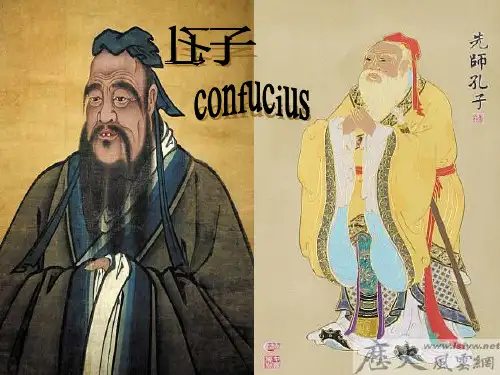
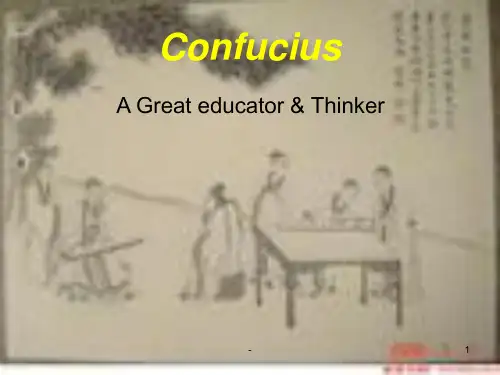
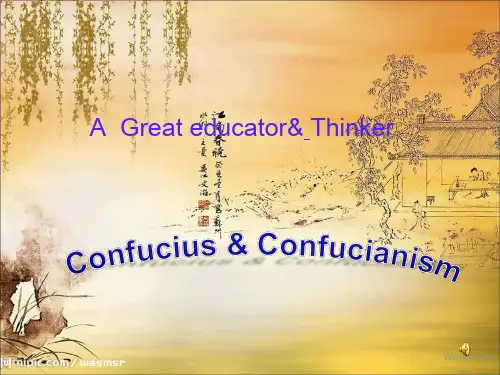
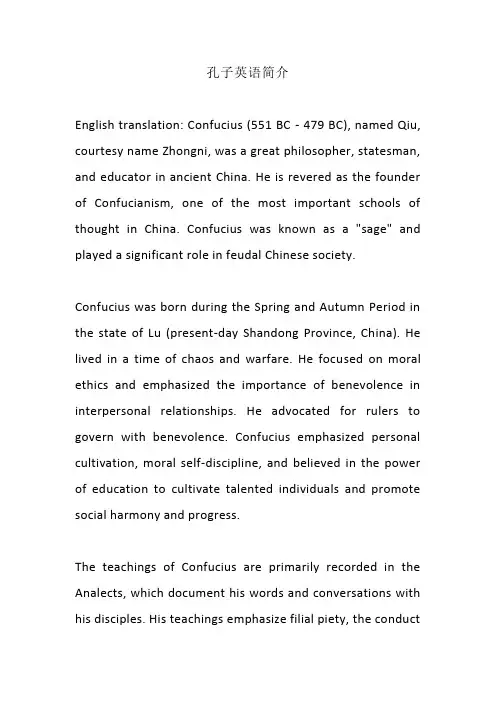
孔子英语简介English translation: Confucius (551 BC - 479 BC), named Qiu, courtesy name Zhongni, was a great philosopher, statesman, and educator in ancient China. He is revered as the founder of Confucianism, one of the most important schools of thought in China. Confucius was known as a "sage" and played a significant role in feudal Chinese society.Confucius was born during the Spring and Autumn Period in the state of Lu (present-day Shandong Province, China). He lived in a time of chaos and warfare. He focused on moral ethics and emphasized the importance of benevolence in interpersonal relationships. He advocated for rulers to govern with benevolence. Confucius emphasized personal cultivation, moral self-discipline, and believed in the power of education to cultivate talented individuals and promote social harmony and progress.The teachings of Confucius are primarily recorded in the Analects, which document his words and conversations with his disciples. His teachings emphasize filial piety, the conductof a noble person, honesty, the concept of ren (benevolence), and rituals. Confucius’education philosophy has had a profound impact in China and other East Asian countries, as Confucianism became one of the core values of traditional Chinese culture.Confucius not only had a direct influence on his students but also left a lasting impact. Confucianism is deeply rooted in Chinese culture and has been passed down through generations in East Asia. Confucius is considered a prophet and a great leader of Chinese culture, and his teachings have played a significant role in the development of Chinese society and the formation of its culture.Confucius was a wise mentor and educator, and his teachings and thoughts are still highly valued today. He is regarded as a guide for individuals to pursue ethical conduct and a harmonious society. Due to his enduring influence, Confucius holds a special place in the history of the Chinese nation and is widely revered.孔子(公元前551年-公元前479年),名丘,字仲尼,号为仁者,是古代中国伟大的思想家、政治家和教育家,被尊奉为儒家学派的创立者。
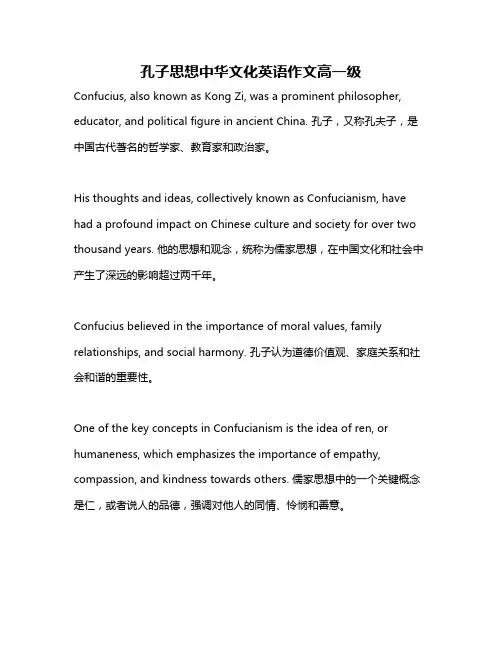
孔子思想中华文化英语作文高一级Confucius, also known as Kong Zi, was a prominent philosopher, educator, and political figure in ancient China. 孔子,又称孔夫子,是中国古代著名的哲学家、教育家和政治家。
His thoughts and ideas, collectively known as Confucianism, have had a profound impact on Chinese culture and society for over two thousand years. 他的思想和观念,统称为儒家思想,在中国文化和社会中产生了深远的影响超过两千年。
Confucius believed in the importance of moral values, family relationships, and social harmony. 孔子认为道德价值观、家庭关系和社会和谐的重要性。
One of the key concepts in Confucianism is the idea of ren, or humaneness, which emphasizes the importance of empathy, compassion, and kindness towards others. 儒家思想中的一个关键概念是仁,或者说人的品德,强调对他人的同情、怜悯和善意。
Confucius believed that individuals should strive to cultivate these virtues in order to become morally upright and contribute to a harmonious society. 孔子认为个人应该努力培养这些美德,以成为道德正直并为和谐社会做出贡献。

Confucius: The Enlightened Sage of ChineseCultureConfucius, the renowned philosopher and educator of ancient China, is revered as the founding father of Confucianism. His teachings, emphasizing morality, ethics, and the importance of education, have shaped the cultural, social, and political landscape of East Asia for centuries. Through his principles of "Ren" (humaneness) and "Li" (ritual propriety), Confucius advocated a harmonious society based on respect, loyalty, and duty. His influence extends far beyond the boundaries of China, making him a globally recognized figure in the history of thought and civilization.孔子,这位古代中国的杰出哲学家和教育家,被誉为儒家思想的创始人。
他的教导强调道德、伦理和教育的重要性,几个世纪以来一直塑造着东亚的文化、社会和政治面貌。
通过“仁”(人类之爱)和“礼”(礼仪规矩)的原则,孔子倡导一个基于尊重、忠诚和责任的和谐社会。
他的影响力远远超出了中国的边界,使他成为思想和文明史上全球公认的人物。
**The Wisdom of Confucius: A Cross-CulturalPerspective**Confucius, a legendary figure in Chinese history,stands as a beacon of wisdom and morality. His teachings, centered around the concepts of "Ren" (humaneness) and "Li" (ritual propriety), promote social harmony and ethical behavior. His influence extends beyond the borders of China, resonating with people across the globe who seek guidancein living a virtuous life.Confucius' emphasis on education as a means to personal and societal growth is particularly relevant in today's world, where knowledge and wisdom are more accessible than ever before. His belief in the transformative power of learning resonates deeply, reminding us that education is not just about acquiring facts but about cultivating character and fostering empathy.Moreover, Confucius' philosophy提倡a respect for tradition and the value of hierarchy, which, while contextualized to the Chinese cultural context, also speaks to the universal human desire for stability and order. His teachings on filial piety and respect for elders, for instance, are not just cultural practices but universalvalues that promote social cohesion and intergenerational understanding.In the globalized world of today, where cultural exchanges and understanding are paramount, the wisdom of Confucius offers a valuable perspective. His teachings on the importance of personal integrity, social responsibility, and the pursuit of excellence in all endeavors are timeless and universally applicable. By embracing the principles of Confucianism, we can work towards building a more harmonious and understanding world.孔子,这位中国历史上的传奇人物,是智慧和道德的灯塔。
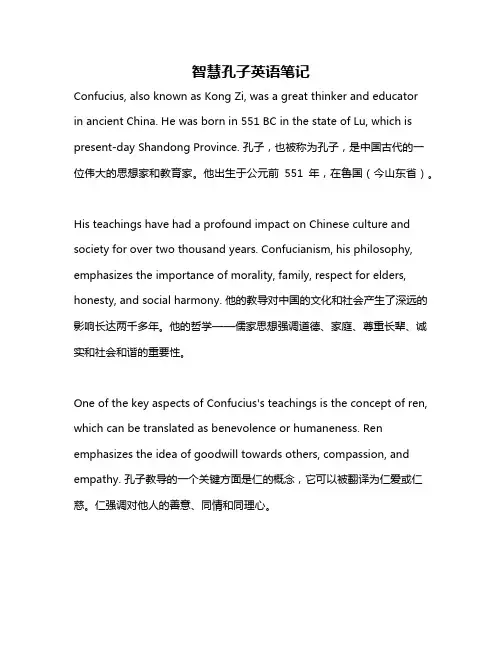
智慧孔子英语笔记Confucius, also known as Kong Zi, was a great thinker and educatorin ancient China. He was born in 551 BC in the state of Lu, which is present-day Shandong Province. 孔子,也被称为孔子,是中国古代的一位伟大的思想家和教育家。
他出生于公元前551年,在鲁国(今山东省)。
His teachings have had a profound impact on Chinese culture and society for over two thousand years. Confucianism, his philosophy, emphasizes the importance of morality, family, respect for elders, honesty, and social harmony. 他的教导对中国的文化和社会产生了深远的影响长达两千多年。
他的哲学——儒家思想强调道德、家庭、尊重长辈、诚实和社会和谐的重要性。
One of the key aspects of Confucius's teachings is the concept of ren, which can be translated as benevolence or humaneness. Ren emphasizes the idea of goodwill towards others, compassion, and empathy. 孔子教导的一个关键方面是仁的概念,它可以被翻译为仁爱或仁慈。
仁强调对他人的善意、同情和同理心。
Confucius believed in the importance of education and self-cultivation. He emphasized the pursuit of knowledge, self-improvement, and the cultivation of virtues such as wisdom, integrity, and filial piety. 孔子信奉教育和自我修养的重要性。
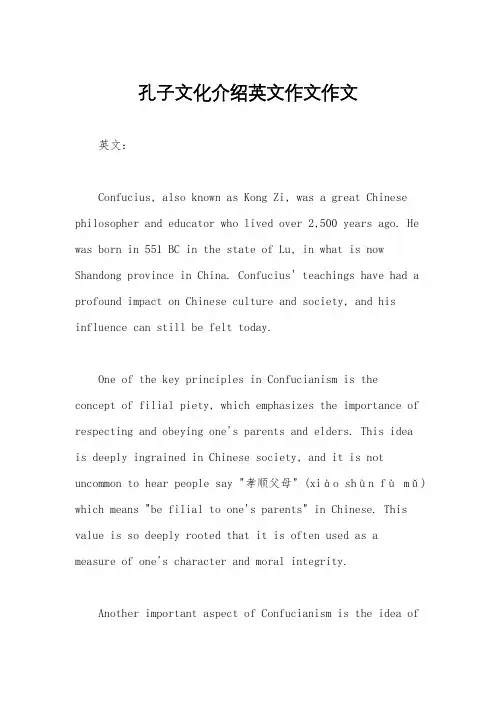
孔子文化介绍英文作文作文英文:Confucius, also known as Kong Zi, was a great Chinese philosopher and educator who lived over 2,500 years ago. He was born in 551 BC in the state of Lu, in what is now Shandong province in China. Confucius' teachings have had a profound impact on Chinese culture and society, and his influence can still be felt today.One of the key principles in Confucianism is theconcept of filial piety, which emphasizes the importance of respecting and obeying one's parents and elders. This ideais deeply ingrained in Chinese society, and it is not uncommon to hear people say "孝顺父母" (xiào shùn fù mǔ) which means "be filial to one's parents" in Chinese. This value is so deeply rooted that it is often used as a measure of one's character and moral integrity.Another important aspect of Confucianism is the idea ofharmony and social order. Confucius believed that a well-ordered society was one in which everyone knew and accepted their place, and where relationships between people were based on mutual respect and understanding. This isreflected in the Chinese saying "和谐共处" (hé xié gòng chǔ) which means "live in harmony" in English. This concept is still highly valued in Chinese culture, and it is often used to promote cooperation and unity in various social settings.Furthermore, Confucius emphasized the importance of education and self-cultivation. He believed that by studying the classics and practicing moral principles, individuals could become better people and contribute to a better society. This is encapsulated in the Chinese saying "博学之,审问之,慎思之,明辨之,笃行之" (bó xué zhī,shěn wèn zhī, shèn sī zhī, míng biàn zhī, dǔxíng zhī) which means "learn widely, inquire thoroughly, think carefully, discriminate clearly, and practice earnestly" in English. This idea continues to be a guiding principle in Chinese education and personal development.In conclusion, Confucius' teachings continue to play a significant role in shaping Chinese culture and society. His emphasis on filial piety, harmony, and education has left a lasting legacy that is still evident in modern Chinese values and traditions.中文:孔子,也被称为孔子,是一位伟大的中国哲学家和教育家,生活在2500多年前。
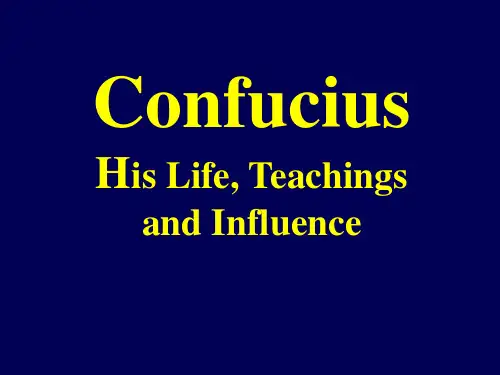
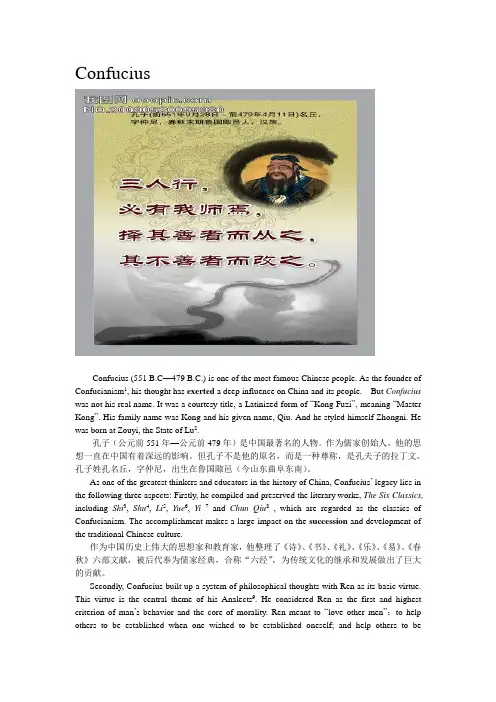
ConfuciusConfucius (551 B.C—479 B.C.) is one of the most famous Chinese people. As the founder of Confucianism1, his thought has exerted a deep influence on China and its people. But Confucius was not his real name. It was a courtesy title, a Latinized form of “Kong Fuzi”, meaning “Master Kong”. His family name was Kong and his given name, Qiu. And he styled himself Zhongni. He was born at Zouyi, the State of Lu2.孔子(公元前551年—公元前479年)是中国最著名的人物。
作为儒家创始人,他的思想一直在中国有着深远的影响。
但孔子不是他的原名,而是一种尊称,是孔夫子的拉丁文。
孔子姓孔名丘,字仲尼,出生在鲁国陬邑(今山东曲阜东南)。
As one of the greatest thinkers and educators in the history of China, Confucius’ legacy lies in the following three aspects: Firstly, he compiled and preserved the literary works, The Six Classics, including Shi3, Shu4, Li5, Yue6, Yi7and Chun Qiu8, which are regarded as the classics of Confucianism. The accomplishment makes a large impact on the succession and development of the traditional Chinese culture.作为中国历史上伟大的思想家和教育家,他整理了《诗》、《书》、《礼》、《乐》、《易》、《春秋》六部文献,被后代奉为儒家经典,合称“六经”,为传统文化的继承和发展做出了巨大的贡献。
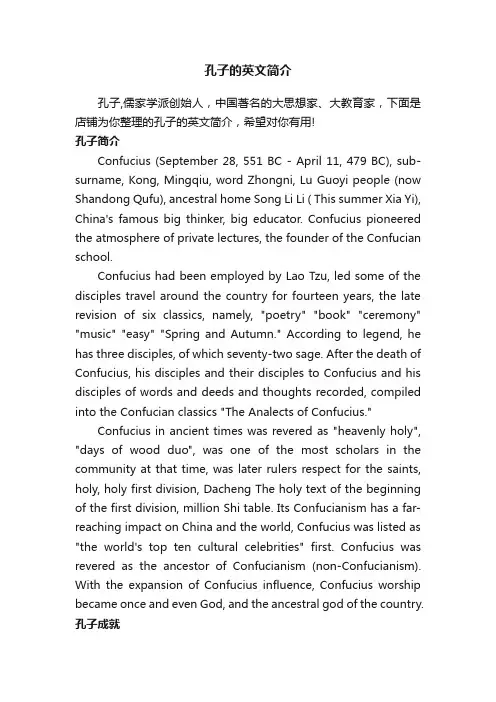
孔子的英文简介孔子,儒家学派创始人,中国著名的大思想家、大教育家,下面是店铺为你整理的孔子的英文简介,希望对你有用!孔子简介Confucius (September 28, 551 BC - April 11, 479 BC), sub-surname, Kong, Mingqiu, word Zhongni, Lu Guoyi people (now Shandong Qufu), ancestral home Song Li Li ( This summer Xia Yi), China's famous big thinker, big educator. Confucius pioneered the atmosphere of private lectures, the founder of the Confucian school.Confucius had been employed by Lao Tzu, led some of the disciples travel around the country for fourteen years, the late revision of six classics, namely, "poetry" "book" "ceremony" "music" "easy" "Spring and Autumn." According to legend, he has three disciples, of which seventy-two sage. After the death of Confucius, his disciples and their disciples to Confucius and his disciples of words and deeds and thoughts recorded, compiled into the Confucian classics "The Analects of Confucius."Confucius in ancient times was revered as "heavenly holy", "days of wood duo", was one of the most scholars in the community at that time, was later rulers respect for the saints, holy, holy first division, Dacheng The holy text of the beginning of the first division, million Shi table. Its Confucianism has a far-reaching impact on China and the world, Confucius was listed as "the world's top ten cultural celebrities" first. Confucius was revered as the ancestor of Confucianism (non-Confucianism). With the expansion of Confucius influence, Confucius worship became once and even God, and the ancestral god of the country. 孔子成就Moral thoughtConfucius built a complete "moral and moral" thought system: at the individual level advocate "benevolence, ritual" virtue and virtue. The moral system of thought is based on the theory of goodness and sorcerer (" Humane and heaven, authentic meet, humane and timely into a methodology of the perfect ideological system.Confucius's Ren said, embodies the humanitarian spirit, Confucius's ritual, it embodies the spirit of ritual, that is, the modern sense of the order and system. Humanism This is the eternal theme of mankind, for any society, any time, any government is applicable, and order and institutional society is the establishment of human civilization, the basic requirements of society. Confucius's spirit of humanism and order is the essence of ancient Chinese social and political thought.Confucius in his later years of the highest ideal called "Datong", in the world of Datong, the world's people, not only their own family for the pro, not only to their parents and children for love, but love each other, love all the people The So that the old end, strong use, the children can get warm and caring, lonely people and people with disabilities have to rely on, men have their own things, women have a satisfactory destination. There is no fraud in the world, no thieves, the road is not picked up, the night is not closed, everyone stresses the letter repair, election Yin Teng can, the road trip also, the world for the public.political ideologyThe core content of Confucius' political thought is "ritual" and "benevolence". On the strategy of governing the country, he advocated "governing morality" and using morality and ritual to govern the country is the most noble way of governing thecountry. This strategy is also called "rule of virtue" or "rule of law". This strategy to Germany, the courtesy of the people, strict hierarchical system, the aristocracy and the common people divided by the rulers and the rulers. Breaking the aristocracy and the common people between the original an important line.Confucius lived in the Western Zhou Dynasty patriarchal tradition of deep Lu, when the ruling power of the Zhou dynasty has been in name only, the princes fighting each other constantly, there has been "Wang Daowei, ritual waste, regime loss, family vulgar" social reality , "Jun is not Jun, Chen Chen, father is not the father, son of child" has become the characteristics of that era. The intensification of social contradictions hinders the development of productive forces, and the human spirit and beliefs have also been unprecedentedly devastated. These together constitute the historical and social conditions of Confucius' political thought. "Ren" and "Li" are the basic spirit of his political thought.Confucius' highest political ideal is to establish the "world for the public" of the Datong society. "Datong" the basic characteristics of society is: Avenue smooth, "the world for the public", which can "choose Yin and can, faith repair Mu", "people are not only pro-pro, not only son of his son, so old end, The use of the young people, young people have long, lonely lonely people who have nothing to do, "conspiracy to cheat, theft can not afford, this is an idealized legend of Yao and Shun era of primitive social scene, but also Confucius The vision of the highest ideal society. "Well-off society" is a lower political goal advocated by Confucius. "The well-off society," the basic characteristics of society is: the road hidden, "the world for home", "the pro-pro, the child of his son, the goods forthemselves", and this rich and poor, A series of rules and regulations, ethics, "to the monarch and grandchildren, to Benedict and his son, to the brothers, to and the couple", "to stand in the field, to Xianxiong know", accordingly also set " , By, "to seek is for, and the soldiers from this." This society is clearly not "Datong" as perfect as the world, but there are normal order, polite, benevolence, faith, justice, so called well-off. This society actually describes the "prosperity" of class society after "private ownership".Confucius' "Datong" society, "well-off" social ideal has far-reaching impact on China's later generations. Later, different periodicals, different stages of the thinkers put forward the different content of the vision of the blueprint and the goal, this idea for the progressive thinkers, reformers also have some inspiration, Hong Xiuquan, Kang Youwei, Tan Sitong and Sun Yat-sen are affected.Economic thoughtConfucius' economic thought is the most important thing of righteousness and lightness, "righteousness" and "enriching the people". This is also the main content of Confucian economic thought, has a greater impact on future generations.Confucius called "righteousness", is a kind of social morality, "Lee" refers to people's pursuit of material interests. In the relationship between "righteousness" and "profit", Confucius puts "righteousness" in the first place. He said: "see the righteousness." Ask people in the material interests of the face of BC, the first should be considered how to meet the "righteousness." He believes that "justice and then take", that is only in line with "justice", and then to get. Confucius even in the "Analects of Confucius Zi" advocated "rare words", that is to say"benefit", but not not "benefit". "Zuozhuan into the public two years" records, do not meet the moral things and get rich, just as clouds, disdain with unreasonable means to obtain wealth. Confucius also believes that the treatment of "righteousness" and "benefit" attitude, can distinguish between "gentleman" and "villain". A moral "gentleman", easy to understand the "righteousness" of the importance of the lack of moral cultivation of the "villain", only know "benefit" and do not know "justice." This is Confucius in the "Analects of Confucius in the" said "gentleman Yu Yi, villain Yu Li." Some people think that since Confucius "righteousness", it is bound to underestimate the manual labor. This view is wrong. "The Analects of Confucius" in the record of his disciples who want to learn agriculture Fan Chi very dissatisfied, called him "villain", it is because Confucius that people have greater ideals and pursuits, to bear the greater responsibility. He wants his students to be the bearers of value rather than a farmer.education doctrineConfucius in the history of China, the first proposed similar to the quality of human talent, personality differences mainly because of the acquired education and social environmental impact ("similarity is also similar"). So that everyone may be educated, everyone should be educated. He advocated "teach no class", founded private school, wide recruit students, breaking the slave owners aristocratic school education monopoly, the scope of education extended to civilians, conform to the trend of social development. He advocated "learning and gifted", learning and spare capacity, went to an official. His education aims to cultivate a gentleman in politics, and a gentleman must have a high moral quality of cultivation, so Confucius stressed that theschool education must be moral education in the first place ("disciples into the filial piety, out of Ti, Panting the public, and the pro-people. Line of spare capacity, then the text ").Confucius in the teaching methods require teachers to "teach no class", "by the state economy" education concept, "individualized", "heuristic" methodology, pay attention to T ong Meng, enlightenment education. He educated students to have honest learning attitude, to be modest and studious, often review the knowledge learned, so that "warm and know the new", new knowledge extended broad, in-depth, "one and the other."The main contents of Confucius' moral education are "ritual" and "benevolence". Which "ceremony" for the moral norms, "benevolence" for the highest moral standards. "Ceremony" is the form of "benevolence", "benevolence" is the content of "ritual", with the spirit of "benevolence", "ritual" really fulfilled. In the moral cultivation, he proposed to establish ambition, self-denial, practice line, introspection, courage to turn over and other methods. "Learning and learning" is the dominant thought of Confucius' teaching thought. While advocating the shamelessly asked, modesty, he emphasizes the combination of learning and thinking ("learning without thinking, thinking and not learning is almost"), but also must "learn to use", the knowledge learned social practice.He first proposed heuristic teaching. He said: "Do not be angry, do not speak without hair." Means that teachers should seriously think in the students, and has reached a certain degree of just right to inspire and enlighten, he is the first practice in teaching practice teaching Family. Through the conversation and individual observation and other methods, he understood and familiar with the personality characteristics of students, on thisbasis, according to the specific circumstances of each student, to take different educational methods, cultivate a virtue, speech, politics, literature and other talents The Confucius loves education and is engaged in educational activities all his life. He learns tirelessly and tirelessly. Not only teaching, more emphasis on teaching, to their own model behavior students. He loves students, students also respect him, teacher-student relationship is very harmonious. He is a typical example of the ancient Chinese teachers.Confucius' educational activities not only cultivate many students, but also put forward the theory of education on the basis of practice, laying a theoretical foundation for ancient Chinese education. Because of the conservative political attitude of Confucius, the reform of the economic system also reflects the conservative thinking. For example, Lu Xuan Gong fifteen years (AD 594 BC) to implement the "early tax mu", from the legal recognition of the legal status of private land, is the Spring and Autumn period of major economic reform; but according to "Zuo Zhuan" Spring and Autumn "when the record" early tax mu ", the purpose is to criticize its" indecent assault ". And the people are not rich, the monarch is not rich. In the "The Analects of Confucius Yao Yue" also recorded, Confucius advocated "for the benefit of the people and benefit", that is beneficial to the people to do things. On the other hand, he also advocated tax to be lighter, corvee apportionment do not delay agriculture. "The Analects of Confucius," the record, Confucius also on the time for the people to preach, ask the government do not be too extravagant, pay attention to thrift. He said: "extravagant is not bad, thrifty is solid. With its not inferior, Ninggu." At the same time, also advocated "section with love." This includes the use ofConfucius' "benevolence" in the economic field.AestheticsThe core of Confucius' aesthetic thought is the unity of "beauty" and "goodness", and also the unity of form and content. Confucius advocated "poetry teaching", that is, the combination of literature and art and political morality, the literature and art as a means of changing social and political means, cultivate an important way of sentiment. And Confucius believes that a perfect person, should be in poetry, ritual, music self-cultivation. Confucius' aesthetic thought has a great influence on the later literary theory.Confucius in the easy to learn clearly put forward the "beauty in which", "a matter of opinion" and other famous aesthetic proposition. Published by the People's Publishing House, "the boy asked easy" on the basis of Yi Zong proposed the United States - masculine, feminine beauty; the beauty of life; the beauty of freedom; That "the beauty of yin and yang, the beauty of life, the beauty of freedom, and beauty can be described as aesthetics of the case."Historical thoughtAn important proposition of Confucius' history is "straight", that is, the study of history to seek truth from facts, not only to attach importance to the basis, but also to "know it, I do not know I do not know" ("politics"), he tried to oppose those arrogant not straight "He is not straightforward, but he does not want to do so, and he does not believe, and I do not know it." ("Taber").Confucius' view of history is not only reflected in the attitude of history and history, but also in the historical development view. Confucius believes that history is constantly "gains and losses", he said: "Yin Yin Xia Li, the profit and loss can be seen also; Zhoubecause of Yin Li, the profit and loss can be seen" ("government"), Zhou is in the summer, On behalf of the foundation to reach an unprecedented civilization. History is not a retrogression, but come from behind, is the development of the forward. Although this idea is very hazy, but it is the history of Chinese history, the evolution of the valuable beginning.Tourism conceptConfucius is rich in life. He realized the incisive philosophy of life from the long travel career and formed a unique view of tourism. Confucius' "tour" has three main forms: tour, study, tour. In other words, Confucius in the tour to ask the teaching, travel in the official Shi Shi, travel in the affectionate, travel in the enlightenment. His travel behavior and study, into the official is inseparable. Confucius' travel ideas can be broadly summarized as follows:Confucius' s View of Distance and NearConfucius said: "gentleman Huaide, villain nostalgia", "people and the nostalgia, not enough for the men." Means a gentleman do not nostalgia for their homeland, should learn through the four parties to learn and realize the lofty ideals and aspirations. It can be seen that Confucius "re-travel", against "Huohuo", "nostalgia" and other psychological and behavior, even to live in love, nostalgia for the gentleman and villain distinction. But Confucius also said: "parents in, not far tour, travel must have", clearly expressed his idea of promoting near travel. "Parents in, not far tour" is also Confucianism to promote the implementation of filial piety, serve their parents, pay attention to the embodiment of human thought.So Confucius both "re-travel", but also against "far travel" to promote "near tour", would it be self-contradictory? Confucius'near-sight and distant view is not contradictory, but the unity of opposites, similar to the relationship between "fish and bear's paw". Travel and near travel, in fact, reflects the Confucian "loyalty" and "filial piety", serve the country and serve the parents of the unity of opposites. Although Confucius advocated "near travel", but also do not blindly exclusion of travel, although advocating the implementation of filial piety, but more advocated "rule the country world." In the end suitable for travel or near travel, choose the standard is whether there is "good". In fact, follow the Confucius travel around the country 14 years of disciples there are many parents who are alive. Confucius opposed only to the legitimate purpose but beyond the reasonable degree of "travel".Confucius focus on cultural tours, natural tour, advocate "landscape than Germany"Confucius life trip to the world, pay attention to listening and enjoyment ceremony, creating a precedent for Chinese cultural tourism. According to historical records: "Confucius was the West into the room, asked the ceremony in the old Dan, Xue Yu Changhong, view of the emperor of the rule." Zuiwangyi not wine, Confucius thought is to learn from the old Dan music. In addition, Confucius visit, and Qi Taishi exchange on the "music" of the views and to achieve the realm of ecstasy. "The Analects of Confucius and": "Son in the Qi Wen" Shao ", learn, March I do not know meat, said: 'not figure for the music of the Sri Lanka also.'" Confucius travel in the four parties to learn, appreciate the ancient ceremony Music civilization, which in fact is now talking about cultural tourism.In addition to promoting the cultural journey to listen to music, Confucius also focus on the natural landscape of the tour.For the landscape of the natural landscape, Confucius pay more attention to the "beauty" of the feelings, such as familiar for us: "Know who Lok water, benevolent Leshan; know who move, benevolent static; knowledge of music, benevolent life." In Confucius, The clever and flowing water has a metaphysical commonality; the generosity of the benevolent is interlinked with the solemn and steady mountains. This is the "landscape than Germany," the aesthetic, experience. "Bi" refers to the symbol or comparison, "moral" refers to the moral or spiritual quality, means that in the enjoyment of landscape natural landscape, according to its characteristics analogy of people's moral character, that is, the natural landscape of humanization.Confucius advocates tourism to be healthy, against lionConfucius said: "Benefit three music, loss of three music. Festival rituals, music people of goodness, music more virtuous friends, benefits carry on. Le proud music, music lost travel, music Yan Le, loss carry on." Said to be proud of to play, to play around, idle for fun, the size of the feast for the music, are harmful to the happy. Visible, Confucius against idle, swinging pleasure, unrestrained play and other lost travel behavior. He believes that lost travel beyond the individual physical and mental capacity and social ritual license, lost travel is a temporary, limited, and will bring their own great damage.Concept of life◎ angry forgotten, happy to forgetConfucius 62 years old, had described himself as: "It is also people, angry, happy to forget, I do not know the old will be to the cloud Seoul." At that time, Confucius has led his disciples around the country 9 years, gone through hardships, not only did not get Princes of the appointment, but also almost killed, butConfucius is not easy to retreat, is still optimistic about uphold their own ideals, and even know that it can not do it.◎ poor musi c RoadIn the eyes of Confucius, justice is the highest value of life, in the rich and the poor and moral contradictions, he would rather be poor will not give up morality. But his poor music and music can not be seen as not seeking wealth, just to maintain the Road, this is not consistent with historical facts. Confucius also said: "rich and expensive, people do not have their own, not the way, not the same. Poor and cheap, people of evil also; not its Road, not to also." " But also for the rich, but also for the whip of the people, I also, if not, from my good.◎ learning and tireless, tireless tirelesslyConfucius is known for his knowledge, and he has a strong interest in all kinds of knowledge. Therefore, he is versatile and knowledgeable. He was famous at the time and was almost regarded as an omniscient saint. But Confucius did not think that Confucius said: "Confucius schoolless division, who has knowledge, who there is something he did not know, he worship who is a teacher, so that" three lines, will be Have my teacher, choose the good and from it, its poor and changed.◎ straight and lineConfucius nature of integrity, but also advocate straight and line, he said: "I also in the people who, who destroyed who reputation, such as the reputation of those who have the test." Sri Lanka people also, the reason why the three generations of the line also. "" Historical Records "contained more than thirty-year-old Confucius in his eloquence in the Lao Tzu, parting when I gave the words:" clever and close to the dead, good people who also. Bo debate the majority of the body, This is the reminder ofConfucius in good faith, but also pointed out that some of the problems of Confucius, is to see the problem is too deep, the speech is too sharp, hurt some of the status of the people, Of people, will bring their own great danger.◎ good with peopleConfucius founded the moral theory of benevolence, and he himself was a very kind person, compassionate, helpful and sincere and generous. "Do not want to do, do not impose on people", "gentleman adult beauty, no adult evil", "bow and thick and thin people" and so on, are his life criteria. Confucius said: "I have five and learn to learn, thirty standing, forty and no doubt, fifty and know destiny, sixty and earning, seventy and from the heart, not overdue." This is the life of their own Stage of the summary.。
孔子的英文介绍孔子的英文介绍:Confucius (551-479 April 11 BC), surname, Confucius, Qiu, the word Zhongni, the Spring and Autumn period Luoyi (now Qufu City, Shandong Province), the ancestral home of Song Liyi (now Xiayi County, Henan Province). Father, Uncle Liang, and Mother Yan. Ancient Chinese thinker, politician, educator and founder of Confucianism.Confucius was familiar with the traditional etiquette system from an early age, and when he was young, he was famous in Lu for his extensive knowledge of etiquette and music, engaged in the cause of Confucianism, and made a living by handling funerals.Middle-aged apprentices give lectures and engage in educational activities. At the age of 50, he once served as the head of the State of Lu and actively promoted his own political ideas. soon after, he abandoned his official and went to Lu because he disagreed with the political views of the rulers. He traveled around the country with his disciples to publicize his political propositions and ideas, but it was of no use.In his later years, he returned to Lu, devoted himself to the cause of education, sorted out the Poems and Books, deleted theSpring and Autumn period, and preached the six arts as his lifelong career. Confucius led some of his disciples to travel around the world for 14 years to revise the six Classics (Poems, Books, Rites, Music, Yi, Spring and Autumn).After his death, his disciples and his disciples recorded the words, deeds and thoughts of Confucius and his disciples and compiled them into the Analects of Confucius. The book is regarded as a Confucian classic.Confucius had a profound and lasting influence on later generations. His "benevolence" and "propriety" have become important norms of national administration and personal self-cultivation; the thought of civilian education of "education without discrimination" enables the inheritance of Chinese civilization infinitely; the systematic arrangement of ancient documents not only places on his own ideals, but also makes the cultural heritage of the Chinese nation have a profound and broad connotation.孔子的中文介绍:孔子(前551年-前479年4月11日),子姓,孔氏,名丘,字仲尼,春秋时期鲁国陬邑(今山东省曲阜市)人,祖籍宋国栗邑(今河南省夏邑县)。
英语翻译技巧之一:中国传统文化篇一:研究生英语翻译-短文翻译(中国传统文化)孔子(Confucius)是春秋时期(the Spring and Autumn Period)的大思想家、大教育家和儒家学派(Confucianism)的创始人,是古代中国人心目中的圣人。
孔子的言论和生平活动记录在由他的弟子或再传弟子编成的(The Analects)一书中。
是中国古代文化的经典著作。
在孔子之后几千年的中国历史上,没有哪一位思想家、文学家和政治家不受的影响。
不研究,就不能真正把握中国几千年的传统文化。
As a great thinker,educator and founder of Confucianism during the Spring and Autumn Period,Confucius is a sage to the ancient Chinese people. His words and life storywere recorded by his disciples and their students in The Analects. As an enduring classic of Chinese culture, The Analects has influenced allthinkers, writers and politicians in the thousand years’ Chinese history after Confucius. No scholar could trulyunderstand this long-standing culture or the inner world of the ancient Chinesewithout this book.大约在两千多年前,中国就出现了蜡染(wax printing)。
在中国服饰中,蜡染是一种流传时间长、流行范围大、使用领域广的服装工艺。
孔子英文版介绍Confucius (born Kong Qiu, styled Zhong Ni) was born in the village of Zou in the country of Lu in 551 B.C., a poor descendant of a deposed noble family. As a child, he held make-believe temple rituals; as a young adult, he quickly earned a reputation for fairness, politeness and love of learning, and he was reputed to be quite tall. He traveled extensively and studied at the imperial capital, Zhou, where he is said to have met and spoke with Lao Zi, the founder of Daoism.Upon his return to Lu, he gained renown as a teacher, but when he was 35, Duke Zhao of Lu led his country to war, was routed and fled to the neighboring country of Qi; in the disorder following the battle, Confucius followed. Duke Zhao frequently came to him for advice, but upon counsel of one of his ministers, he decided against granting land to Confucius and gradually stopped seeking his counsel. When other nobles began plotting against Confucius' position, Duke Zhao refused to intervene, and Confucius returned to Lu. But conditions there were no better than before, and Confucius retired from public life toconcentrate on teaching and studying.At age 50, he was approached by the Baron of Qi to help defend against a rebellion, but he declined. He was later made a city magistrate by the new Duke of Lu, and under his administration the city flourished; he was promoted several times, eventually becoming Grand Secretary of Justice and, at age 56, Chief Minister of Lu. Neighboring countries began to worry that Lu would become too powerful, and they sent messengers with gifts and dancers to distract the duke during a sacrifice holiday. When the duke abandoned his duties to receive the messengers, Confucius resigned and left the country.Confucius spent the next five years wandering China with his disciples, finding that his presence at royal courts was rarely tolerated for long before nobles would begin plotting to drive him out or have him killed. He was arrested once and jailed for five days, and at 62 he was pursued, along with his disciples, into the countryside by a band of soldiers sent byjealous nobles, until he was able to send a messenger to the sympathetic king of a nearby country, who sent his own soldiers to rescue them. Once again, Confucius was to be given land but was denied it upon counsel of another high minister. After further wanderings, he eventually returned to Lu at age 67. Although he was welcomed there and chose to remain, he was not offered public office again, nor did he seek it. Instead he spent the rest of his years teaching and, finally, writing. He died at 72.孔子(名秋字仲尼)生于鲁国邹村在我国公元前551年, 元老废黜了一个贫苦家庭高贵. 作为一个孩子,他认为地以为庙祭; 作为一个年轻的成年人,他很快赢得美誉公平、礼貌、爱学习,他被誉为是相当高大. 他走遍了研究和广泛的帝国首都周据说他曾与交谈老子,道家创始人. 返回卢,他赢得声威当老师,但是当他35岁赵吕公爵率领乌加战争是落花流水逃往邻国齐; 在混乱的战斗后,孔子之后. 杜克赵常找他请教,但他的一名律师在部长会议他决定对孔子逐渐停止批地给他的律师求. 当其他贵族开始密谋对付孔子地位杜克赵拒绝介入,孔子返鲁. 但没有任何条件比以前更好、离退休孔子退隐专心教学和学习. 50岁时,他遇见了男爵齐协防打击叛乱,但他拒绝. 他后来被新县长作了一个城市格洛斯特路而在他主政全市蓬勃开展; 升任几次,终于成为大政司司长, 年仅56岁,首席部长鲁. 周边国家开始担心,将成为卢太强大送信、送礼物、跳舞,他们分散在公爵牺牲假期. 当公爵遗弃职务领取送信,孔子辞职,离开该国. 未来5年内花费孔子与弟子中徘徊, 法院认定他出席皇家贵族很少容忍多久便开始密谋把他或他杀死. 他被捕入狱后五天,他是在62追求,随着他的弟子, 到郊外一阶士兵发出嫉妒贵族, 直到他能够体谅国王派遣使者到邻近的国家, 当年送自己的士兵拯救. 再次,孔子得到它的土地,但遭到拒绝后,高律师另一个大臣. 进一步漫游后,他终于回到鲁年仅67. 虽然他并没有选择留欢迎,他没有向公职再次他也不求. 而他花了他多年的教学和休息,最后写作. 他死在72.Confucius孔子的英文简介One of the most famous people in ancient China was a wise philosopher named Confucius (circa 551-479 BC). He sometimes went by the names Kong Zi though he was born - Kong Qiu - styled Zhong Ni. He was born in the village of Zou in the country of Lu.This chinese man was a well-known leader in philosophy and he also made many wise phrases and theories about the law, life, and the government. Philosophy is a kind of a system of ideas and thoughts that talk about the human's behavior, the rules that you should follow to make a successful life, and about the government.In other words, it's about thoughts and theories that teach other people lessons about principles, or rules, about life and it also teaches you a moral ( sort of like the morals that are at the end of a fable). Confucius is famous for his philosophy because he made many wise sayings in ancient China that helped many people learn about nature, the world, and the human behavior. He also helped the government and the emperor by teaching them lessons on how the emperor should rule his kingdom successfully.Confucius was born in a poor family in the year 551 B.C., and he was born in the state of Lu. His original name was K'ung Ch'iu. His father, commander of a district in Lu, died three years after Confucius was born, leaving the family in poverty; but Confucius nevertheless received a fine education. He was married at the age of 19 and had one son and two daughters.He worked as a keeper of a market. Then he was a farm worker who took care of parks and farm animals. When he was 20, he worked for the governor of his district.。
孔子中英文介绍中文介绍:孔子,原名孔丘,是中国古代伟大的思想家、政治家、教育家,儒家学派创始人。
他出生于公元前551年,出生于现在的山东省曲阜市。
孔子年轻时曾在鲁国担任过官职,后来因为政治主张未能得到实施而离开鲁国。
此后,他周游列国,传播自己的思想和学说,但同样未能得到广泛认同。
晚年回到鲁国后,他主要致力于教育和培养弟子,传承儒家学派。
孔子的思想和学说对后世影响深远,被视为中国传统文化的重要代表之一。
英文介绍:Confucius, originally named Kong Qiu, was a great thinker, politician, and educator in ancient China. He was the founder of Confucianism. Born in 551 BC in Qufu City, Shandong Province, Confucius once served as an official in the state of Lu. Later, he left Lu because his political ideas were not implemented. After that, he traveled to other countries, spreading his ideas and teachings, but they were not widely recognized. In his later years, he returned to Lu and mainly focused on education and training students to pass on Confucianism. Confucius' ideas and teachings have had a profound influence on future generations and are considered one of the important representatives of traditional Chinese culture.。
孔子(Confucius)Confucius: The Great Sage of Ancient China
孔子(Confucius),an eminent philosopher, educator, and statesman of ancient China, is revered as the founder of the Confucian school of thought. His teachings continue to shape Chinese culture and influence the world to this day. Born in the tumultuous period of the Zhou Dynasty, Confucius dedicated his life to the pursuit of moral and social harmony. His philosophy emphasized the importance of ethical conduct, filial piety, and the cultivation of personal virtues. Through his teachings, he sought to establish a harmonious society built upon the principles of benevolence, righteousness, and propriety.
Confucius's teachings, recorded in the Analects, provide invaluable guidance on personal conduct, education, and governance. His emphasis on the value of education and self-improvement laid the foundation for the Chinese tradition of lifelong learning.
As a revered figure, Confucius's influence extends far beyond the realm of philosophy. His teachings have profoundly shaped Chinese social norms, family values, and moral ethics for over two millennia. His emphasis on the importance of respect, harmony, and social order continues to resonate with people around the world.
For Chinese high school students, studying Confucius's teachings not only fosters a deep appreciation for their cultural heritage but also instills a sense of responsibility and moral consciousness. Confucius's teachings serve as a guiding light, encouraging students to strive for personal excellence and contribute to the betterment of society.
孔子(Confucius)
中国古代伟大的思想家、教育家和政治家,儒家学派的创始人,被尊崇为圣人。
他的思想至今仍在塑造中国文化,并对世界产生影响。
孔子出生于周朝动荡时期,他致力于追求道德和社会和谐。
他的哲学强调道德行为、孝顺和个人品德的培养。
通过他的教导,他试图建立一个以仁爱、正义和礼仪为基础的和谐社会。
孔子的教诲被记录在《论语》中,对个人行为、教育和治理提供了宝贵的指导。
他强调教育和自我完善的价值观为中国终身学习的传统奠定了基础。
作为一个备受尊敬的人物,孔子的影响超越了哲学领域。
他的教导深刻地影响了中国社会规范、家庭价值观和道德伦理两千多年。
他强调尊重、和谐和社会秩序的重要性,至今仍在全球人民中产生共鸣。
对于中国的高中学生而言,学习孔子的教导不仅培养了对自己文化传统的深刻理解,还灌输了责任感和道德意识。
孔子的教导为他们指明了前进的方向,鼓励他们追求个人卓越,为社会的进步做出贡献。